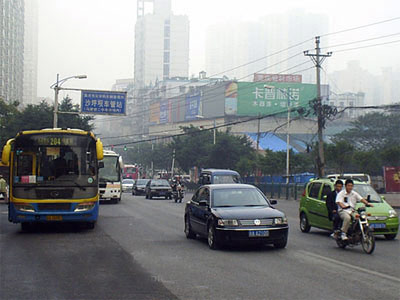Governments have made compromises with taxi drivers on strike in the southwestern municipality of Chongqing and a scenic town in central China's Hunan Province.
|

|
|
No cabs can be found in Chongqing streets during the rush hour this morning. |
The Chongqing municipal government has promised to reduce the fees that drivers pay to their companies, although the strike that began on Monday continued on Tuesday. However, most cabs in the downtown areas resumed business on Tuesday night.
In Fenghuang County, Hunan Province, all cabs were back on road by Tuesday afternoon as the county government promised to reduce the drivers' annual operation fees, said Zeng Wensong, deputy director of the publicity department of the county committee of the Communist Party of China.
Drivers' representatives accepted the fee proposal at a meeting on Tuesday morning and "the traffic order in the county returned normal," said Zeng.
The official also said the government and drivers were still negotiating on the amount of the fee reduction.
Drivers in the mountainous area, which is reputed to be one of "the 10 most beautiful counties in China" for its natural beauty and the primitive culture of the Miao ethnic group, went on strike on Oct. 28 to protest annual operating fees.
Fenghuang has two cab companies with 145 licensed cabs. Some drivers' licenses will expire by the end of this year and they have been asked to pay 10,000 yuan (about 1,450 U.S. dollars) a year to renew their licenses.
In Chongqing, the government made a breakthrough on easing discontent among the cab drivers.
The daily fee Chongqing cab drivers pay to their companies will be reduced by 70 yuan, down from 440 yuan, said a government spokesman on Tuesday in Chongqing.
It is illegal for cab companies to increase the fares without government permission, said Zhou Bo, deputy publicity director of the Communist Party of China (CPC) Chongqing Municipal Committee, adding that high fee was the main reason for the cabbies' strike.
Shortages of compressed natural gas (CNG) which fuels most cabs in Chongqing, competition from unlicensed cabs and high fines for traffic violations ignited the strike, according to the government.
In addition, the government would revise the division of fares between drivers and companies in favor of the drivers, said Zhou, admitting that the details and methods were yet to be decided.
Unlicensed cab drivers would be penalized to protect the interests of licensed drivers, said Zhou.
The city's publicity department announced on Tuesday night that about 80 percent of the city's 8,000 taxis had resumed operation as of 9 p.m. after the municipal government moved to tackle their grievances.
Xinhua reporters saw an obvious increase in the number of cabs in downtown areas, and police patrolled taxi stations.
However, fear of retaliation from drivers still on strike and the threat of their vehicles being smashed led some drivers to bring their family or friends along in their taxis.
Liang Peijun, deputy director of the city's transport administration, said 103 cabs were vandalized in the past 48 hours and his administration had sent 12 task forces to cab companies to investigate.
The municipal government would ensure the safety of the drivers and their interests, said Liang.
Cab companies promised to pay for the loss and exempt drivers from their daily fees, as a move to get the employees back to work, said Liang.
The government was still considering whether direct supervision of the companies or legislating on income was the best move, but it was studying issues, including administration costs and the workloads of drivers.
The municipal government would also increase the daily supply of 100,000 cubic meters CNG. Chongqing has 75 fuel stations, including 46 in major urban zones.
Drivers normally wait one to three hours to refill their CNG tanks at a limited number of fuel stations, and a taxi needs to be fueled four times a day.
A cab driver in Chongqing has to pay company owners 380 yuan to 440 yuan a day in fees, and owners are believed to have profited massively by extracting ever higher monthly payments in return for the right to drive.
About 800 of the urban cabbies in the fourth-largest city of China returned to work by 2 p.m. on Monday, some with transport officials in their passenger seats as protection from their striking colleagues.
Chongqing has about 1,000 cab companies, with 34 taxi companies that own more than 100 cabs each, including two owned by the municipal government, said Wang Shiqi, director of the city cab association.
(Xinhua News Agency November 4, 2008)